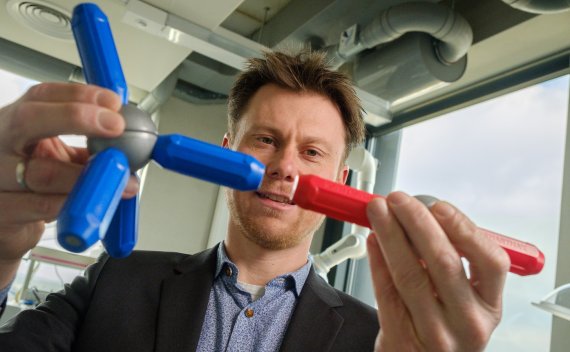Chemist Louis de Smet wants to develop gas sensors based on porous organic polymers
© Guy Ackermans
De Smet is the man behind the Louis de Smet Research Lab, part of Professor Han Zuilhof’s Organic Chemistry chair group. His group focuses on developing organic materials capable of selectively binding certain compounds, for example for the purpose of purification or detection.
Existing gas sensors work by adsorbing gases onto metal oxides, explains De Smet. ‘The disadvantage is that they work at very high temperatures. They are also non-specific: they detect gas, but don’t tell you which gas or in what concentrations.’ This means their applicability is limited.
De Smet wants to make sensors based on porous organic polymers, which he creates using an (organic) amine and an aldehyde. He connects them up using what is known as an imine bond. That produces flat, honeycomb-like networks. Stacking these networks creates cavities that can hold the gas. He also wants to use building blocks that are not planar to create 3D networks. ‘Think of a kind of sponge,’ says De Smet. Coating sensors with the polymer will result in a new type of gas sensor that can operate at room temperature.
That is the basis. But the nice thing about the concept, thinks De Smet, is that the sensors can in principle be designed to be highly selective in the gases they detect. It is a question of adding the right chemical ‘grippers’ to the cavities. ‘The research will initially focus on establishing the proof of principle for the technique,’ says De Smet. ‘If this platform works, you can use the chemistry to make the sensors selective.’
The idea is that the new sensors can be used in industry, the food sector, healthcare and security services.
De Smet got his grant from the NWO’s new Start-Up fund. The chemist already secured a major EU research grant three years ago at Delft University of Technology and in 2007 he was awarded a Veni grant.

